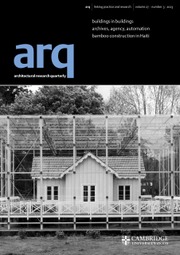Article contents
Producing space, the confrontation between abstract space and everyday life: ‘I wunder if heaven got a ghetto”1
Published online by Cambridge University Press: 28 November 2013
Abstract
This paper is intended as a contribution to current debates about the changing conditions of urban space and uneven development. It will analyse the functions of the architectural professions in this process and how their productions prefigure the social and economic arrangement of space. It will examine these notions through analysis of Cardiff Bay and will analyse the changes occurring under late capitalism in the shift to Post-Fordist modes of accumulation. While the paper will examine the local space of Cardiff Bay, the analytical ground will be extended to the ongoing restructuring of space under the new global economies at a macro scale.
Urban restructuring is most evident in the decentred metropolis of the post-modern city, the new cities for consumption. The growth or collapse of multinational capital needs to be seen as framing the occupation of space, its investment and disinvestment, and as an ongoing process, part of a systematic reprogramming of space that can and should be examined at every stage of its operations.
Relocating the economic, political and social into considerations of space means that the paper will also incorporate historical analysis of modes of production and social formations. To consider space as ideological means that transfigured space must also be considered. The paper will therefore raise ideas that are directed towards the transformation of social and political space, and will examine that which identifies Lefebvre's distinction between appropriated and dominated space.
Information
- Type
- Theory
- Information
- Copyright
- Copyright © Cambridge University Press 2013
Footnotes
Anonymous graffiti, Bute Street, Cardiff Bay.
References
1 Anonymous graffiti, Bute Street, Cardiff Bay.
- 1
- Cited by

